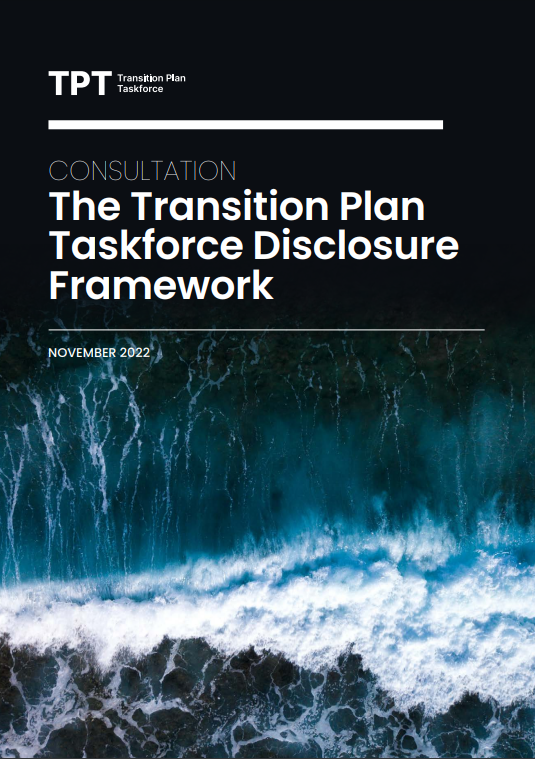Author: Alex Cooper
Date: 9 November 2022
A year on from its announcement at COP26, and with the eyes of the world on Egypt’s COP27, the UK Transition Plan Taskforce (TPT) published its Disclosure Framework and related Implementation Guidance yesterday (8 October 2022).
The UK Government has stated that it intends to require listed companies, asset managers and regulated asset owners to publish transition plans, and the TPT’s disclosure framework is designed to represent the ‘gold standard’ for this. Therefore, it is to be expected that any regulations or listing rule requirements (which apply to listed companies, asset managers and regulated asset owners) will be close to the TPT’s disclosure framework.

What does the framework say?
The framework has some requirements which should by now be familiar to those preparing corporate disclosures. As with the Taskforce on Climate-related Financial Disclosure (TCFD) requirements, in accordance with which listed companies, asset managers and asset owners are required to disclose on a ‘comply or explain basis’ – the framework requires disclosure of key climate-related metrics and targets, risks and opportunities.
However, the framework goes further, proposing that companies should be required to set out how they intend to respond and contribute to a whole-economy transition to a low carbon world. The TPT states that “[t]ransition plans should reflect the urgency to act. An entity’s transition plan should therefore be informed by both national commitments and the latest international agreement on climate change” – so the goals of the Paris Agreement and Glasgow Climate Pact of limiting global temperature increase to 2°C and pursuing efforts to limit to 1.5°C should be considered in company’s transition plans.
The TPT framework states that companies should disclose how they intend to meet their greenhouse gas reduction targets and other climate goals. This includes disclosing:
- changes to products and services offered by the company required to meet its climate goal;
- internal policies and conditions on climate-related matters, such as deforestation, energy usage, requirements for suppliers etc., and how they relate to the company’s transition plan;
- financial planning related to the transition plan, and how the company expects its financial position to change as a result of the transition; and
- sensitivity analysis, including key assumptions relating to regulatory and policy change, technological developments, and other transition risks.
Companies are also required to say how the Board has reviewed and approved the transition plan, as well as whether the Board considers the transition plan in setting the company’s wider strategy, risk management and decision making.
What does this mean for Board members?
Directors’ legal obligations include a duty to act with due care, skill and diligence. It has often been remarked – including in relation to climate change, by Lord Sales, Justice of the Supreme Court, that this duty is not fixed, but has to consider the wider regulatory and social context.
If companies are legally required, or – perhaps to a lesser extent – if it becomes common practice, to disclose transition plans, it seems that the standard of care would encompass the matters set out in the transition plan. It would therefore become part of directors’ duties to set out how their company will adapt to the energy transition, taking into account the Paris goals.
Further pressure on directors is likely to come from investors, in particular those with long-term investment horizons, which are increasingly likely to expect companies in which they invest to disclose their plans for adapting to a transitioning economy.
Directors should start to think now about whether their company’s transition plan is adequate, and how they can oversee its implementation and progression.
